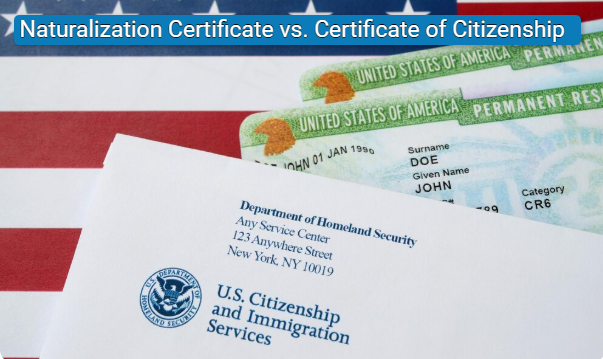Certificate of Citizenship vs. Naturalization Certificate: Understanding the Difference
When it comes to U.S. citizenship, there’s often a lot of confusion surrounding the terms Certificate of Citizenship and Naturalization Certificate. You might have heard one or both of these terms tossed around in conversations, but they represent two different legal documents that serve different purposes.
If you’ve recently become a naturalized citizen or you’re in the process of applying for citizenship, you may find yourself wondering, What’s the difference between a Certificate of Citizenship and a Naturalization Certificate? Don’t worry—you’re not alone in this. Many people find these terms confusing, and that’s why we’re here to help break them down.
In this post, I’ll walk you through the Certificate of Citizenship vs. Naturalization Certificate debate in clear, simple language. We’ll explore their differences when you receive them and why they matter. Let’s get started.
What is the Difference Between Naturalization and Citizenship?

Before we dive into the documents themselves, it’s important to understand the difference between naturalization and citizenship. Citizenship is the legal status of being a member of a particular nation, granting you specific rights and responsibilities. If you’re born in the U.S., you are automatically a U.S. citizen under the principle of jus soli (right of the soil).
Naturalization, on the other hand, is the process by which someone who was born outside of the United States becomes a U.S. citizen. This process involves submitting an application, passing a citizenship test, taking an oath of allegiance, and receiving approval from U.S. Citizenship and Immigration Services (USCIS).
Simply put, Citizenship refers to being a citizen of a country, and naturalization is the legal process by which an immigrant becomes a citizen of that country.
Certificate of Citizenship vs. Naturalization Certificate: What’s the Real Difference?
Now that we understand the basic terms, let’s focus on the key difference between the Certificate of Citizenship and the Naturalization Certificate.
Certificate of Citizenship
A Certificate of Citizenship is a document issued to individuals who were born outside of the U.S. but acquired citizenship through their parents. This typically applies to children born abroad to U.S. citizen parents who meet the requirements for transmitting citizenship.
For example, if you were born abroad and one or both of your parents were U.S. citizens at the time of your birth, you may automatically be a U.S. citizen. In this case, you would need to apply for a Certificate of Citizenship to formally recognize your U.S. citizenship.
Naturalization Certificate
A Naturalization Certificate is issued to individuals who were not born in the U.S. but went through the naturalization process (i.e., they were immigrants who successfully became U.S. citizens). This document serves as proof of their citizenship after they’ve passed the naturalization process, which includes submitting Form N-400, completing a biometric appointment, taking a citizenship test, and taking the Oath of Allegiance.
In short, if you became a U.S. citizen through naturalization (after applying and meeting the requirements), you will receive a Naturalization Certificate.
Key Differences: Naturalization Certificate vs. Citizenship Certificate

Let’s look at the key differences between these two documents:
Criteria: Certificate of Citizenship, Naturalization Certificate
Who Receives It: Individuals born abroad to U.S. citizen parents. Individuals who became U.S. citizens through naturalization
Eligibility: Must prove that one or both parents were U.S. citizens at the time of birth. Must complete the naturalization process (Form N-400, Oath of Allegiance, etc.)
Proof of Citizenship: Proof of citizenship for children born abroad to U.S. citizen parents. Proof of citizenship for immigrants who became U.S. citizens through the naturalization process
How to Apply Using Form N-600
Why is the Certificate of Citizenship Important?
A Certificate of Citizenship is an essential document for people who were born outside the U.S. but automatically acquired citizenship through their parents. This certificate can be particularly important in situations where proof of U.S. citizenship is required, such as:
- Applying for a U.S. passport
- Proving eligibility for federal benefits
- Establishing identity in various legal matters
- Verifying U.S. citizenship in cases of inheritance or family law
If you’re someone who was born abroad but automatically became a U.S. citizen because of your parents’ citizenship status, this Certificate of Citizenship is your proof of that legal status.
When is a Naturalization Certificate Needed?
If you’ve gone through the naturalization process, a Naturalization Certificate is your legal proof of citizenship. It’s the key document that confirms your U.S. citizenship, and it’s required in situations such as:
- Applying for a U.S. passport
- Applying for a U.S. government job
- Verifying U.S. citizenship for benefits or legal purposes
- Establishing U.S. citizenship for your children or grandchildren
Essentially, if you weren’t born in the U.S. but became a U.S. citizen through the naturalization process, the Naturalization Certificate is a critical document that you will likely need for various applications and legal matters.
The Difference Between N-400 and N-600: What You Need to Know

If you’re navigating the naturalization or citizenship process, you may have encountered Form N-400 (Application for Naturalization) and Form N-600 (Application for Certificate of Citizenship). These forms serve different purposes:
- Form N-400 is for individuals who are seeking to become U.S. citizens through naturalization. If you’re an immigrant applying for citizenship, you’ll file this form.
- Form N-600 is for those who are seeking a Certificate of Citizenship because they automatically acquired U.S. citizenship through their parents. If you were born outside of the U.S. and your parent(s) were U.S. citizens at the time of your birth, you will file this form.
The main difference here is that N-400 is for people applying to become citizens (naturalization), while N-600 is for those who already have citizenship through their parents and need to apply for the official certificate.
The Difference Between a U.S. Citizen and a Naturalized Citizen
You may hear the terms U.S. citizen and naturalized citizen used interchangeably, but they aren’t the same. U.S. citizens include both those born in the United States and those who became citizens through the naturalization process.
A naturalized citizen is an individual who was born outside of the U.S. and went through the legal naturalization process to obtain U.S. citizenship. The main difference is that naturalized citizens go through the formal application process and take the Oath of Allegiance, whereas citizenship by birth is automatic.
While both types of citizens enjoy the same rights and responsibilities, naturalized citizens may face some specific legal challenges if their citizenship status is ever questioned, so it’s important to have the proper documentation, such as the Naturalization Certificate.
Why the Naturalization Certificate and Certificate of Citizenship Matter
Both of these certificates are incredibly important. They serve as legal proof of your U.S. citizenship, and they’re often required for a range of legal, financial, and personal matters. Without them, you may find it difficult to prove your citizenship status when applying for things like:
- U.S. passports
- Government jobs
- Social Security benefits
- Financial assistance
- Legal recognition of your citizenship
Ready to Secure Your U.S. Citizenship Documentation?

If you’re ready to apply for your Naturalization Certificate or Certificate of Citizenship, our team of experienced immigration attorneys is here to help. Contact us today at Passage Immigration Law, and let us simplify your path to U.S. citizenship.
Disclaimer: This article offers general legal information, not legal advice. Do not rely upon this information without seeking legal counsel. If you need legal advice, you may contact us directly to speak with an attorney. We disclaim all liability with respect to actions taken based on any information presented. Every case is different, and outcomes will vary depending on the unique facts and legal issues of your case.







